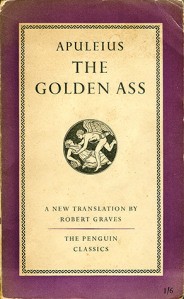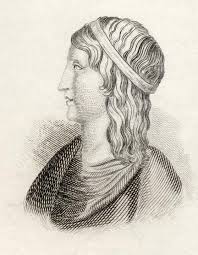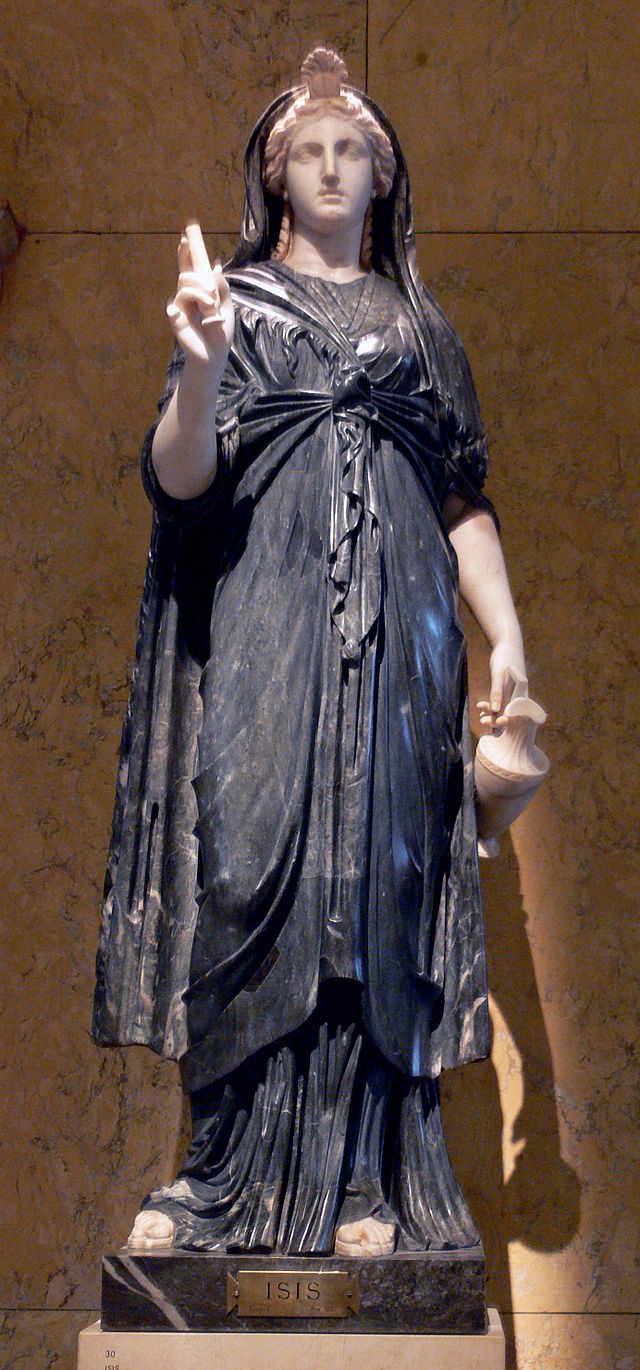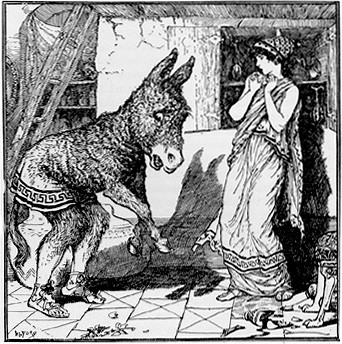By Ben Potter
Regular readers might recall that from time to time we investigate the origins of the novel. So far we’ve looked at the bucolic innocence of Longus’ Daphnis and Chloe as well as Petronius’ quasi-pornographic romp The Satyricon.
Hot on such esteemed heels we now come to the only Latin novel that is extant in its entirety.
Not only that, but it is probably the only substantial piece of prose from the ancient world that can hold its own in the modern sense. It does not largely (or solely) rely on being ‘of interest’ or ‘historical importance’, but is instead that most elusive and wonderful of things: a elegant piece of literature and entertainment in its own right.
The recipient of this rather obsequious eulogizing is Lucius Apuleius and the text in question is the exemplary Metamorphoses, commonly referred to as The Golden Ass.
A quick internet search of the book will often regurgitate adjectives such as ‘bawdy’ or ‘picaresque’ and, whilst both are certainly justifiable, they do not quite do this peculiar (perhaps unique) work due service.
We could also call it a semi-autobiography, a cautionary guide for a young nobleman, or a set of Milesian Tales (so influential to Chaucer’s Canterbury Tales).
Far ore than anything else, The Golden Ass is a work of religious devotion – and a proselytizing one at that.
To fully appreciate this, we need to understand a little about Apuleius himself.
At this point regular readers will be expecting the almost stock-phrase: ‘Unfortunately we have almost no biographical information about [inset name] and what we do have is highly dubious’.
Well surprisingly, and unlike many other noteworthy characters from antiquity, not only do we have a decent amount of information to go on, but it also paints a picture of an extremely colorful life.
Born in the North African town of Madaurus, Apuleius was a true man of the world. Studying first at Carthage, then Athens, he eventually made his way to Rome where he studied Latin oratory and took a place at the bar.
However, this was not before he managed to flit away the small fortune bequeathed to him by his father through drinking and whoring his way around Greece, during a trip to the Olympic Games.
His later taste for the law may well have germinated from the necessity to defend himself against accusations of black magic when, shortly after marrying his friend’s mother, said friend promptly died.
The fact that the bride was enormously wealthy, as well as significantly advanced in years, convinced the family he had bewitched her and poisoned him.
Apuleius’ tongue-in-cheek (and victorious) legal defense, A Discourse on Magic, is his other, significant, surviving work.
In fact, all this sin and scandal does not diminish, but accentuates, the most important feature of Apuleius’ life; his devotion to the gods.
Not to the whole ancient pantheon mind you, but primarily to Isis, Osiris and then later, Asclepius.
But it is to Isis that The Golden Ass is foremost devoted.
The vehicle Apuleius uses to exalt his goddess is a broad plot almost completely lifted from either Lician of Samosata or Lucius of Patras, whose efforts, Ass and The Ass respectively, follow the same basic thread:
- A nobleman engages in activities not worthy of his station
- He dabbles in the dark arts
- He is accidentally transformed into a donkey
- This incarnation allows him to spy on private conversations and see all sorts of ribald behavior
- He suffers greatly before regaining human form
The first two steps set up the precautionary tale, not exactly against impiety, but ‘mis-piety’. Classics legend Robert Graves explains:
“A nobleman should not play with black magic: he should satisfy his spiritual needs by being initiated into a respectable mystery cult along with men of his own station”.
However, it is the last step to which Apuleius gives his most serious attention.
His transformation comes about through the kindness of the goddess Isis and he, in turn, devotes his life to her.
The religious allegory is not a subtle one; when a man behaves badly, when he dishonors or disregards the gods, he must go through the trials and tribulations of bestial servitude and suffering. Only upon accepting Isis into his heart will he be truly humanized and given the opportunity to enjoy the fruits of the hereafter.
One suspects that Apuleius would have been rather pleased at learning some considered his work to be no more than a series of foolhardy and lubricious frolics. This seems exactly the point of the work – to not be considered overtly religious, but to charm, compel and covertly convert.
Though that’s not to say that he was entirely dismissed as an indecorous interloper into the world of tasteful literature.
It seems the black magic accusations against him caused some to see The Golden Ass as a literal memoir rather than an amusing recruitment tool… or indeed a work solely of wit and whimsy.
The Christian community, or at least its intelligentsia, were apparently genuinely troubled that Apuleius’ miraculous exploits were perceived as even more wonderful than those of Christ. Indeed, several centuries later, the Inquisition did their utmost to transform The Golden Ass once and for all into ashes.
Apuleius’ countryman, St Augustine, stated that his pagan predecessor “either reported or invented his transformation into asinal shape”.
In fact, the lives of these two devout Africans run along parallel lines, i.e. Carthage university, debauchery, residence at Rome, salvation. The key difference being that Apuleius chronicles his transformation with a sense of humor, a little less vitriol, and far less pomposity.
Unlike Augustine who wallowed in the blissful guilt of his youthful transgressions until he was old and grey, Apuleius saw his debaucheries as pleasurable pit stops on the road to enlightenment.
He appreciated what many of us know, though don’t always like to admit: that the follies of youth are what maketh the man.
He doesn’t quite go as far as to say that fornication and degradation are necessary rites of passage… but if he does speak of regretting them, then he does so with a suppressed smirk and a twinkle in his eye.
After all, a young man cannot remain a crude beast forever, but that doesn’t mean he shouldn’t enjoy his asinine desires while they last.














No comments yet. You should be kind and add one!
Our apologies, you must be logged in to post a comment.